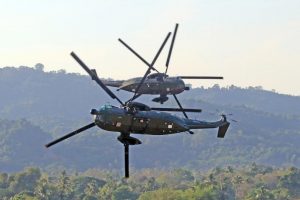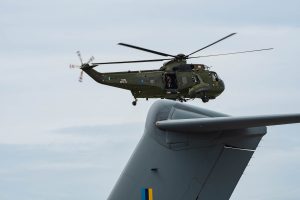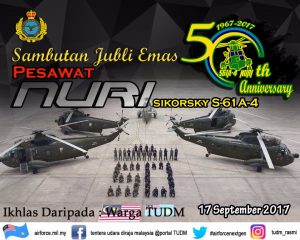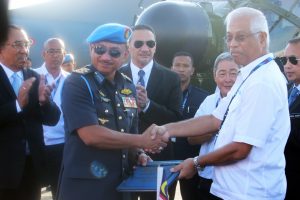SHAH ALAM: Selamat Jalan Nuri? It appears that the Defence Ministry is looking to lease helicopters to replace the Nuri in service with RMAF and the Army. The Nuris, according to Defence Minister Mohamad Sabu are grounded. He said in Parliament on Nov. 27 that although the spare parts were readily available, the helicopters have been involved in various crashes and are quite old.
He said the ministry was expediting the process of leasing the replacement helicopters to allow operations from troop transport and others be conducted, prior to the purchase of buying new helicopters for RMAF.


Mohamad was answering a question from an MP on the status of the fleet following the emergency landing of a Nuri at an army camp near the Malaysian-Thai border last August. Leasing is likely the option for RMAF going forward


For further details read this article on Jane’s


Based on this it is likely that this will effectively means that the Nuri in RMAF service, at least, will be retired, unless of course the government allocated additional funding for the fleet. The decision also put paid to any chance of the upgrade programme for the Nuri of being funded. The Army, which is supported by RMAF to operate its Nuris will also have to look at leasing another helicopter as well.


As the Army is looking to buy assault helicopters in the next RMK, it is likely it will be happy to let go off the Nuri as well. RMAF in its CAP 55 plan had envisioned of having two helicopter squadrons, of one type past 2030.
The proposed leasing contract will also be an opening for MHS Aviation as it has five Airbus H225 helicopters in storage. The helicopters purchased between 2011 and 2013 were put in storage after Petronas terminated the contract for flight services with MHS citing safety concerns following the crash of a H225 in Norway in 2016.
The contract was officially terminated in 2017. MHS had came to an amicable agreement with Petronas and several parties over the contract termination in March, 2018. RMAF as you are aware also operates 12 Airbus H225 helicopters purchased in 2010 following the crash of a Nuri in 2007.
–Malaysian Defence
If you like this post, buy me an espresso. Paypal Payment

View Comments (91)
Dikatakan Nuri hanya grounded dan tidak officially retired.
Soalannya adakah nanti Nuri tetap akan digunakan lagi tapi dgn limited number dan service? Maksudnya penggunaan Nuri yg masih 'muda' drpd yg lain dan Nuri yg telah menerima upgrade/refurbish baik dlm TDM atau TUDM.
Reply
Betul but if the lease contract is done it is unlikely that RMAF will continue to operate the Nuri as money allocated to the Nuri will be used to pay for the leased helicopters
better than operating the old nuri. hope they got good deal on the leased heli. and some of the Nuri will be put in museum for future exhibit??
I'm not favourable of using EC225 still at the moment as there is another crash recently off South Korea. If civil aviation are not convinced with 737MAX, why take chances with EC225 when the aircraft are still buggy?
Why lease? EC225 owned by boustead/MHS should be transferred FOC to mindef as part of reparation for the LCS delays!
I think airforce still can go for civil "MHS Aviation H225“ leasing but Army might need a military option. Mi-171 might be cheapest workhorse for the Army.
Michael - “ Mi-171 might be cheapest workhorse for the Army”
You sure about that? If you take into account the total operating costs of a Mil-17 for a period of say 25 years (including spares, changing time expired comments and the needed overhauls); how does it compare to Western equivalents? How many thousand of hours can a Mil-17 fly before needing depot level maintenance and overhauls? How many millions will the Malaysian taxpayer pay to
integrate Western avionics to RMAF/army Mil-17s?
Typo above.
LCS (gowind), not LCA.
zack - “better than operating the old nuri”
Let’s be clear one thing : the issue with the Nuris is not because they’re are “old”.
The issue is that the government for many years (starting in the 1990’s) never approved repeated requests by the RMAF for a full upgrade. The previous government belatedly approved an upgrade and the present government was also in no hurry to allocate funding and eventually decided to postpone/delay (like the Hawk and Charlie upgrade) the upgrade.
Water under the bridge but the Nuri still has lots of life left and if upgraded (to make it more capable of all night/bad weather IFR flights and also more economical to maintain) still has a lot to offer.
Avionics upgrade for mi-17
You have a wide choice, from the usual israeli suspects to cobham, honeywell, gensys etc.
http://slideplayer.com/slide/1449151/4/images/2/Mi+8+%2F+17+Helicopter+Avionics+Upgrade.jpg
As for the costs, surely we have the numbers, from bomba use of the type.
....,
Upgrading the Mil-17 or integrating and certifying non Russian stuff has long been possible (various companies can do it) and is something we seriously looked at in the early 2000’s when SME was trying to get the contract for the army to supply
Ulan Ude sourced helis.
The issue is how much we’re willing to spend and the time factor; especially given that the OEM’s cooperation is needed; to liaise and work with the suppliers of the non Russian stuff that is selected. Also in the event the government remains tight fisted and refuses to fund a simulator; we’ll have to look
around for one we can rent hours on but the Albion’s fit will be different to our modified Hips.
BOMBA’s ex Kazakh Hips are a much older model; made by Kazan. In the event we buy Mil-17s it could (on paper) be from Ulan Ude (which had a previous tie up with AIROD) or Kazan. Newer Hips will incorporate various improvements including longer lasting components and part glass cockpits but the question still stands : when compared to Western equivalents and when taking into account full/total life cycle costs; which is the more cost effective solution in the long run and which will be able to offer higher serviceability/operational rates?
Reply
Bomba flight crews for the Hips went for simulator training in Ukraine last month. Likely